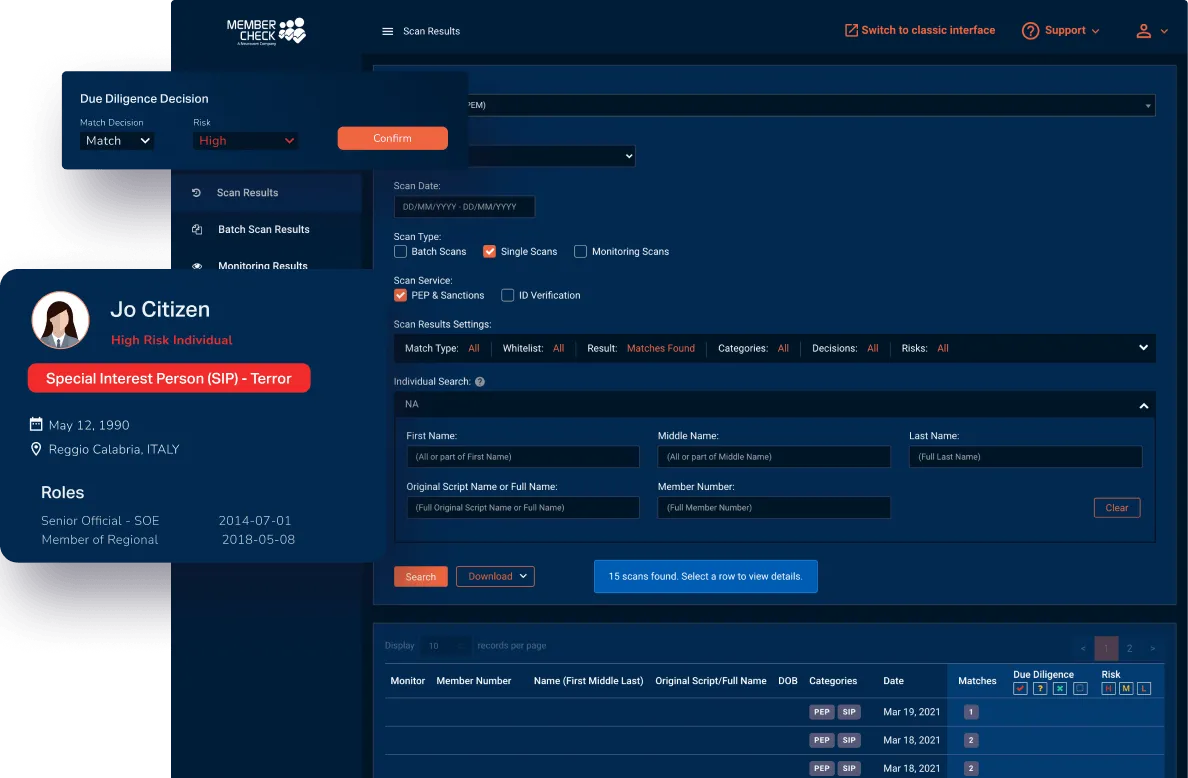

AML/CFT Supervisors in Romania

The National Office for Prevention and Control of Money Laundering (ONPCSB)
The National Office for Prevention and Control of Money Laundering (ONPCSB) is the designated Financial Information Unit, which has the authority to collect, store, investigate, analyse, and disclose the conducted financial intelligence under the terms and procedures of the Law No. 129/2019 on the prevention and sanctioning of money laundering and terrorism financing (AML law).
Other authorities that monitor for compliance with key obligations under the AML Law include the Romanian National Bank, the Financial Supervisory Authority, and the National Office for Gambling.
How to comply with AML/CTF regulations in Romania?
The AML Law establishes a series of duties for the obliged entities. These include:
- Duty to establish measures of customer due diligence (standard, simplified or additional) to:
- Identify the customer and verify their identity
- Identify the real beneficiary and take reasonable steps to verify their identity
- Duty to have adequate risk management systems, including procedures based on risk assessment, in order to determine whether a client or the real beneficiary of a client is a politically exposed person (PEP).
- Duty to retain all the records obtained by applying the customer due diligence measures, for a period of 5 years from the date of termination of the business relationship or from the date of the occasional transaction.
- Duty to retain supporting documents and records of transactions for a period of 5 years from the date of the termination of the business relationship or from the date of the occasional transaction.
- Duty to designate one or more persons who have responsibilities in the enforcement of the AML Law.
- In the case of credit and financial institutions, duty to designate a compliance officer at a management level.
- Duty to establish internal policies and procedures for managing the risks of ML/TF, which include at least the following elements:
- Enforceable customer due diligence measures
- Enforceable measures for reports, records, and all documents retention
- Enforceable internal control, risk assessment and management, compliance and communication management measures
- Enforceable measures regarding the protection of the own personnel involved in the process of applying these policies, against any threats or hostile or discriminatory actions
- Training and periodic evaluation of employees.
- Depending on the size and nature of the activity, duty to provide an independent audit function in order to test these policies and procedures.
- Duty to ensure regular training of employees regarding the provisions of the AML Law.
- Duty to identify and evaluate the risks of the activity carried out regarding the exposure to ML/TF, considering risk factors.
What are my AML/CTF reporting obligations?
Reporting entities must report suspect transactions to the ONPCSB if they know, suspect or have reasonable grounds to suspect that:
- The property is derived from criminal offences or is related to terrorist financing; or
- Information in the possession of the reporting entity may be used to enforce the provisions of the AML law.
The reporting entities must also submit a report for suspicious transactions to the ONPCSB when the objective factual circumstances related to a business relationship or occasional transactions correspond in whole or in part to the indicators of typologies of suspect transactions publicly presented by the ONPCSB.
The reporting entities shall also consider any business relationship or occasional transaction with a person whose identification data has been communicated by the ONPCSB in a targeted manner as a suspect.
Reporting of non-suspect transactions
The reporting entities shall have the obligation to report to the ONPCSB cash transactions, in RON or in foreign currency, whose minimum limit represents the equivalent in RON of 10,000 euros, including transactions that are linked to each other.
The credit and financial institutions shall submit reports on external transfers to and from accounts, in RON or in foreign currency, the minimum limit of which shall be the equivalent in RON of 10,000 euros, including transactions that are linked to each other.
For the activity of remittance, the reporting entities shall send reports to the ONPCSB on the transfers of funds whose minimum limit represents the equivalent in RON of 2,000 euros.
More information:
How can MemberCheck Help?
Our clients are provided with a secure and simple solution in regard to scanning for politically exposed or high-risk individuals, as well as checking names against sanction, regulatory, law enforcement, and other official lists.
Use our sophisticated scan filters and due diligence workflow to minimise the amount of time you spend sorting through, false matches. Scan results and reporting sections allow you to access customer details, whenever and wherever required, as well as download reports, to customise for further investigation or to provide evidence of your AML program compliance for auditing purposes.









* This page is intended as general information only and should not be relied on as the sole source of information for your AML obligations and AML program. Please visit your local regulatory authority sites for the latest relevant and full information.




